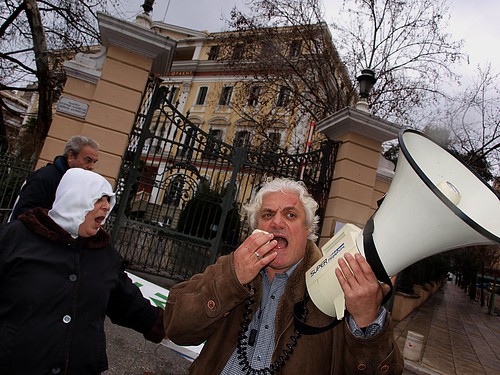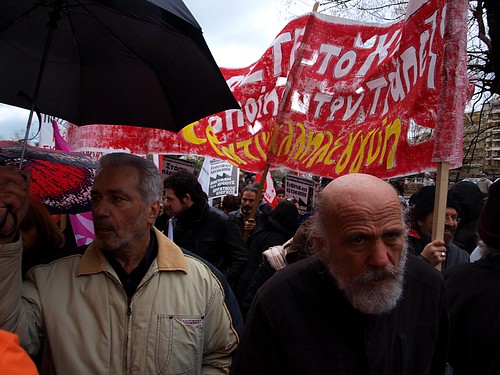Protest march in Thessaloniki, Greece in support of nationwide general strike, a photo by Teacher Dude's BBQ on Flickr
As the negotiations between Athens and the country's creditors over the terms of the next austerity measures wind up there is a growing sense on the internet and in the streets that Greece is tipping over into disaster. While it's easy to get carried away by the hyperbole and hysteria that accompanies much of the reporting of the present situation the reality may indeed be living up to the feverish imaginations of headline writers.
Unemployment has continued to climb as the number of businesses going under increases, in part the result of falling incomes and a series of crushing demands by Athens for more and more tax revenue. The irony is that each increase in either direct taxation such as that on properties or indirect via VAT has brought less and less money into government coffers. Yesterday's Greek Finance Ministry report showed that instead of an expected rise in revenue Greece's income has dropped by 7%.
At every single turn price hikes have resulted in fall of consumption, even for items as basic as heating oil, as people either do without or turn to alternative sources such as wood often illegally logged from the country's forests.
Yet despite all evidence to the contrary, the European Union and in particular the German political leadership is insisting on yet more cuts in public spending on pensions and health, more job losses and a drastic cut in the minimum wage. Hardly surprising, given this and the years of vilification the German right wing press Greeks are becoming more open to anti-German feeling, as witnessed by the burning of a German flag outside parliament during yesterday's demonstrations in Athens. While many have been quick to condemn such actions such sentiments are the exception rather than the rule as anger, frustration and indignation replace calmer analysis.

In response to the latest cuts trade unions called a general strike for Tuesday with limited results, many public sector employees carried on working while the turnout for marches was low, with just a few thousand participating in Athens and Thessaloniki. Some argued that the last minute nature of the call combined with unusually low temperatures were to blame. However, I believe there is a growing despondency which has taken hold of people, the conviction that whatever they do nothing will change, feed by the fact that after two years of austerity and four years of economic decline marches, strikes and other protests have not succeeded in halting the malaise.
This, however, should not be mistaken for acceptance, no matter how grudging, of the new economic measures, anger over those and disgust with the current political system is greater than ever. It's is now an article of faith that no member of government can appear in public without presence of riot police units to protect them from their own voters, sometimes even members of their own party. What people lack is a focus for their frustration and the possibility that they can change the present situation.
With the dissolution of established forms of protests and dissent there is a growing danger that popular anger will explode in ways that cannot be directed or contained in the traditional way and with unpredictable consequences. With money drying up and families resources dwindling more and more people will be open to any suggestion, no matter how radical or extreme that offers them even a glimmer of hope for the future.

No comments:
Post a Comment